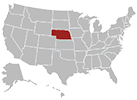
A sterile processing technician is an essential medical professional who sterilizes equipment after and before procedures to ensure patients and physicians are safe.
In Nebraska, there’s a high demand for this job among its many hospitals, meaning you’re more likely to find a career in this field in this state.
Preparing for this life path requires a few steps that get you certified and ready to work.
Page Navigation
Steps to Become a Sterile Processing Technician in Nebraska
Only four states in the country have state-based certification programs for sterile processing technicians.
Nebraska is one that does not require this certification, though you must still get a national certification to begin this career.
While associate’s and bachelor’s degrees are available in this field, they’re not strictly necessary to start.
They’re only helpful if you plan on moving to a higher-paying position.
During your training program, you’ll spend at least 1-2 years learning about patient management, sterilization, customer service, and medical terminology.
These career skills will make it easier to transition to a certification program and, after completing that, an internship course. Internships help you learn the hands-on steps necessary for success in this field.
Earning Certification
Typically, you will need either a Certified Registered Central Service Technician or a Certified Sterile Processing Management path to start this career.
A CRCST is probably the most widely recognized and is used in Nebraska.
It is issued by the International Association of Healthcare Central Service Material Management.
You’ll need to have a high school degree or GED to begin this course.
You must also pass a drug screening and a criminal background check to start.
Then, you need to take a training course that introduces you to sterile processing technology, including multiple training pathways.
For instance, you will have 120 hours in decontamination procedures, 120 hours in preparing and packaging instruments, 96 hours in sterilization and disinfection, 24 hours in storage and distribution, 24 hours in quality assurance, and 16 hours in equipment management.
Then, you can sit for the test in an appropriate IAHCSMM facility and begin looking for jobs.
How to Find Jobs in Sterile Processing Technology
After completing your training in this field, you can start looking for a job.
Nebraska hospitals typically offer multiple internships where you can master your abilities.
You can then check through job boards online, talk with your training facility, and speak with professionals near you.
Typically, you’ll have a short training period on the site where you’ll learn their unique methods and approaches, including what techniques they prefer using.
These short but essential training periods help acclimate you to the individual processes used at Nebraska healthcare facilities.
Sterile Processing Technician Schools in Nebraska
Though not every state has sterile processing technician programs, Nebraska has at least two programs that you can use for your needs.
These schools provide comprehensive training that helps prepare you for the unique demands of this career.
Nebraska Methodist College

Nebraska Methodist College provides a class-based approach that also includes clinical trials at Methodist Hospital.
During this course, you’ll learn how to be a sterile processing technician and will be prepared to pass the national exam.
The exam fee is not included in the course prices, so make sure you’re prepared to cover that cost as well.
Expect your training to last a few months to ensure you get the comprehensive training you need.
This accelerated course offering is designed to fit all your classes in quickly, so be prepared for a fairly heavy workload.
You’ll pay just $780 for this training course, which is one of the least-expensive options in the state for any medical field.
You will need scrubs and closed shoes as well.
Furthermore, you need to prove that your vaccinations are current and that you can safely work in a medical facility.
You’ll also pay $200 upfront for your seat and pay $580 two weeks before the first day of class.
The $200 is just to ensure that you have a seat in the program.
If you don’t pay this deposit, you’re likely to miss out on your chance until the following semester.
Southeast Community College

Southeast Community College provides HLTH 1250 to help prepare students for this career.
You’ll learn how to handle medical equipment and surgical equipment and sterilize them safely.
Courses focus on things like anatomy, physiology, microbiology, and body systems.
Beyond these courses, you’ll also learn chemical disinfection, decontamination, patient care, and packaging equipment.
This comprehensive package of courses will ensure that you can begin your career correctly.
You pay $1,979 for the whole class, which takes multiple semesters to finish.
Sterile Processing Technician Schools in Nebraska – Summary Table
Top 2 Schools in Nebraska
| School Name | Address |
|---|---|
| Nebraska Methodist College | 720 N 87th St, Omaha, NE 68114, USA |
| Southeast Community College | 8800 O St, Lincoln, NE 68520, USA |
Salary
Average salaries for sterile processing technicians in Nebraska are about $42,082, with a low of $33,209 and a high of $54,995.
That’s lower than the national average of $45,891 and the lows of $36,214, and the highs of $59,973, but not incredibly.
That means this career might be an excellent option for people who want to start a job quickly and with reasonable pay.
Annual Salary Range:Average Salary of Sterile Processing Technicians in Nebraska
| City Name | Salary |
|---|---|
| Omaha | $36,090 |
| Lincoln | $35,770 |
| Bellevue | $36,090 |
| Grand Island | $35,270 |
| Kearney | $35,270 |
| Fremont | $35,510 |
| Hastings | $35,270 |
| North Platte | $34,610 |
| Norfolk | $32,790 |
| Columbus | $35,270 |
Regional Salary in Nebraska
| Region | Employed | Avg. Annual Salary | Avg. Hourly Pay | Top 10% Annual Salary | Bottom 10% Annual Salary |
|---|---|---|---|---|---|
| Lincoln, NE | 100 | $38,590 | $18.55 | $39,000 | $36,130 |
| Omaha-Council Bluffs, NE-IA | 340 | $38,920 | $18.71 | $46,220 | $31,730 |
* Employment conditions in your area may vary.
Frequently Asked Questions
Do I Need to Keep a Certification Up to Date Every Year?
All sterile processing technicians must keep their certifications current every year to continue working.
Nebraska is no different because you’ll have a national and not a state-based certificate for this job.
Typically, your hospital or healthcare facility will tell you when it’s time to get certified and may help with some costs.
How Much Does a Certification Fee Cost?
Expect to pay at least $125 to keep your certification updated every year.
You’ll take a small certification exam, one that is much less sprawling than your initial certification test.
You can take this test with your co-workers to streamline this process.
Do Nebraska Sterile Processing Techs Make Good Money?
Nebraska sterile processing technicians make an average of $42,000 every year, which is below the state’s average wage of $66,000.
However, it is still well within the state’s poverty index, meaning you can usually live quite comfortably when you work in this position.
What Facilities Hire Sterile Processing Technicians in Nebraska?
Hospitals like Bryan Medical Center, Nebraska Medicine, Nebraska Methodist Hospital, Annie Jeffrey Memorial County Health Center, and Antelope Memorial Hospital all hire sterile processing techs.
Some might even have short-term training programs to make your career transition more manageable.




